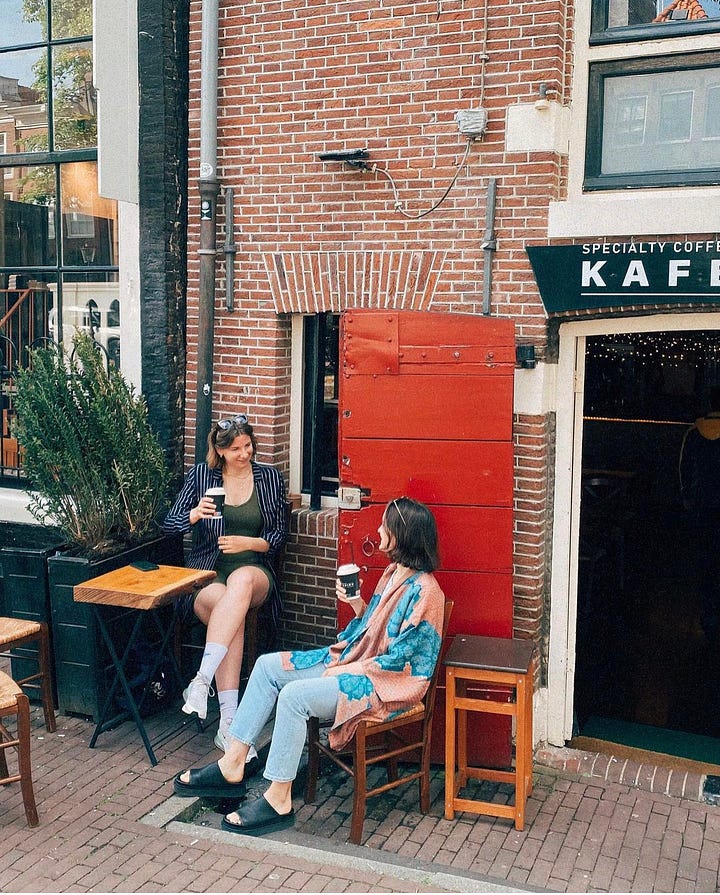Heya friends, happy Friday!
Writing to you this week from sunny Sardinia, which is a treat. I took one week off and some friends from San Francisco casually broke the internet / went viral / made a lot of tech CEOs upset with their shenanigans of placing cones on top of various Cruise / Waymo AVs, rendering the cars unable to drive. It was covered by The Guardian, TIME, TechCrunch, Jalopnik, CarExpert (!), and so many more. So today I’m kicking this week off with the Week of Cone (🦄, 🍦).
Week of Cone
To begin this edition, I’d like to put my own twist on this story as the people behind this movement are indeed my friends (hi!). I’ve been in their homes, we’ve made pasta and cringe-watched The White Lotus together (not binge-watched, yes cringe-watched). TechCrunch may cast them as “robotaxi haters” which is one way of viewing it (I will say, they do hate cars lol).
This same group of people are some of the most caring, passionate, and silly people I’ve ever met in the safer streets realm. They phone into city council meetings and voice their support for safer streets, organize (successful) protests when transit funding is on the chopping block, and marshal inclusive rides throughout the city to welcome more people into transportation activism. It’s all more than I’ve seen from a tech CEO recently (or ever?). Maybe if we’re lucky one of them will agree to a guest post (🤞, if you’re reading this I’ll bribe you with tomato confit).
One thing that people keep circling the drain on is the idea that AVs are better than human drivers. What people miss is that this protest isn’t about that. It’s about AVs and all human-operated cars being less sustainable than public transit and other sustainable modes. And the fact that these AVs are not for shared use, like these companies always promise they will be. And that without fixing our infrastructure and policies, we will continue to compromise on how good things could be. Helsinki got to vision zero by lowering speed limits (The Guardian). Vancouver got to >50% sustainable mode shift by building bike lanes and investing in transit (City of Vancouver). The solutions are here, today, and guess what? They don’t require billions of tech investment. They require political willpower.
And last but not least: if your “advanced transportation solution” can be immobilized by a cone… is it really that advanced? My inbox is open for any folks interested in a debate, although I will warn you, I’m on Italian time.
Ok time for the news-news! Sorry if it’s a bit slim, turns out dinner at 10pm every-night impact my ability to write the newsletter 😂
All of the Week of Cone content for your reading pleasure
SF Standard: The CPUC has delayed their vote to expand AVs access in San Francisco until next month (this vote was the impetus for the Week of Cone, which is now… the Month of Cone lol)
Safe Street Rebel: Activists respond to the delayed vote. “The CPUC must address the fundamental misallocation of power by creating frameworks for the cities to hold these companies accountable.”
Washington Post: City leaders in SF are fuming that a State-level body (the CPUC) could allow Cruise and Waymo to operate 24/7 without the City’s consent
TechCrunch: Cruise and Waymo say humans are bad drivers (I mean true, but that doesn’t mean the solution is more “smarter” cars)
SF Standard: Watch a Cruise run a red light in SF and almost get hit by a bus
Car ownership can entrap people in poverty
This long read was fascinating, and it focused on the pros and cons of car ownership for low-income Americans, focusing on how even when people have access to a car, the financial burden of maintaining it can hinder a person’s ability to save money.
“The part I didn’t expect, that came up organically in interviews, was that low-income people were already buying cars and struggling to own and maintain cars. I think many people, including myself, had naively assumed that subsidizing a car for someone meant that they’d go from taking the bus or biking or walking to all of a sudden driving,” he says. “It’s not that most lower-income people are not able to own a car. It’s that they’re not able to hold onto those cars, and the used car market is incredibly fraught.”
People often think businesses hate bike lanes because they are “bad for business”, but as this article notes, oftentimes the opposite is true. Infrastructure that makes it safer for people to walk and bike to a business tends to attract more people, and increase spending.
“.. it’s striking to see the same groups now bang the gong for bike lanes, vehicle bans and pedestrian-focused facelifts. Reeling from the rise of remote work and the ongoing effects of the Covid pandemic, business groups are embracing policies and practices they long shunned.”
The more you know!
People for Bikes announces the best cities to bike in the US (People for Bikes)
NHSTA rejects call to make AV test reporting mandatory (FreightWaves), and proposes AV STEP to regulate AVs across the country (Automotive News)
Utah is getting an urban gondola. If you know my opinions on this, you know I’m pretty meh on gondolas, but maybe a ski town is the best place for this to work. At the price tag of $729M, here’s hoping it does (Deseret News).
Portlands *Freight Plan* calls for more *bike lanes* just to make my heart swoon (Bike Portland).
Police are using AVs for video surveillance footage 🫠 (The Guardian, TechCrunch)
VW starts testing their AV “Buzz” in Austin
VW has found a new partner in Mobileye after their previous autonomous tech partner ArgoAI shut down last year, and now they’re bringing an autonomous bug van to Austin, TX. VW is also creating a new subsidiary, Volkswagen ADMT, that will be based in Austin and Belmont, CA.
WeRide secures AV license in UAE
The Chinese start-up has received the first national license to test Level 4 AVs on public roads. The license is a step toward UAE ruler Sheikh Mohammed bin Rashid Al Maktoum’s vision of making 25% of the country’s transportation fully autonomous by 2030. WeRide joins Cruise in the UAE, which has a permit to operate in Dubai.
The more you know:
Uber thinks that one day AVs could make up to 20% of “drivers” on their platform (FastCo) [I am fascinated that this implies that human drivers will always be around, and be the majority of drivers]
Arrival attempts to forego bankruptcy via a SPAC (TechCrunch)
The UK’s first driver-assistance vehicle that is allowed to operate hands-free is officially on the market (The Guardian)
TuSimple got an extension before being delisted by the NY Stock Exchange (Freight Waves)
Most Americans know expanding highways doesn’t improve traffic flow
“More than two-thirds of Americans understand that the highway expansions happening in their backyards won't fix congestion as local pols often claim— and many want those officials to stop spending money on projects that endanger their families, a new poll finds.. Researchers found that a staggering 67 percent either "strongly" or "somewhat" agreed with the statement that “expanding highways takes years, causes delays, and costs billions of dollars.” Meanwhile, the same percentage agreed that "widening highways attracts more people to drive, which creates more traffic in the long run," defeating the stated purpose for countless road expansion projects across the country.”
We need a Department of Sidewalks
“Sidewalk conflict isn’t new. Competition for space has always been fierce. More than that, our history has been marked by quite serious versions of sidewalk conflict, many of which persist. For generations, so-called respectable women were expected not to walk the sidewalks alone. But as women entered the workforce and used public sidewalks more freely, those sidewalks became a space for feminist empowerment and social change. Even so, many women continue to be made to feel unsafe on sidewalks.”
Some random stream of thoughts / ideas / learnings from my last week of travels:




Amsterdam: Alright, cancel me, but I did not take one single bike ride in Amsterdam. However, I walked 36k steps one day and managed to cross almost every corner of the city in a few short days. My main recommendations include the MOCO Museum and Westerpark’s very cute urban farms.
Sardinia: Bug spray is of equal importance to sunscreen. When your friend gets stung by a jellyfish, the first stop is the pharmacy, and the second is gelato (obligatory). If I don’t eat at least a bowl of tomatoes daily, then I have failed. Few things are as delightful as writing this newsletter as my friends play Bananagrams and my favourite song comes on the speaker.
This NYT piece about how as cities get hotter and hotter (thanks / no thanks to climate change), we need rivers to be safe enough to swim in to help increase access to public places where people can cool down.
That’s all from me. Have a beautiful weekend friends.
Sarah









